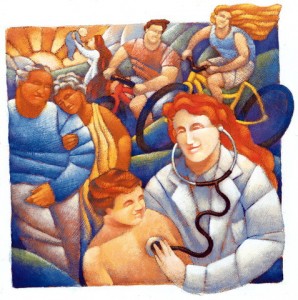The origin of the name of this blog, HealingHospitals.com came from decades of seeking a better way to transition an old model to a more meaningful, experiential approach to caring for people. This would actually provide transformational experiences for the patients and their families in a more interactive and participatory way. (HealingHospitals was named a top 50 hospital administration blog.)
In a recent conversation with a clinical psychologist, I learned that we generally become our habits or, in fact, our habits become us. Accordingly, to change, to grow, to transition and to flourish, we have to work very hard at changing those habits that are not benefiting us personally: over indulgence, negativity, low self-esteem, or whatever the issue(s) may be.
How does this apply to an organization? Every organization that I have ever experienced has a distinct personality and, in its own way, habits, as well. Sometimes the personality of the organization is imposed by its leaders, but usually there are layers and layers of practice that have become part of the culture of that organization; practices –for better or worse– that have accumulated over time.
My observations of numerous hospitals have also provided me with an understanding of the myriad of habits that no longer make sense in today’s world; habits still being embraced that literally produce negative results, and are not only insensitive to the needs of both the staff and the patients, but also are many times intellectually and emotionally caustic to all participants. We’ve written several times about the disparaging nature of the “parent-to-child” management styles prevailing in many hospitals amongst staff, physicians, and administrators, but this is just the proverbial tip of this particular iceberg.
 Many hospitals are wonderful examples of business models that flourished during the Industrial Revolution. Employees still swipe time cards into time clocks, bells and pagers go off all day and all night; professionals poke and prod patients without any explanation. How many times have you observed the 84-year-old being wheeled into a cold, uncarpeted hallway, parked near a wall with nothing to see, nothing to do, and no one to talk to for long stretches of time while waiting for tests about which he or she knows very little?
Many hospitals are wonderful examples of business models that flourished during the Industrial Revolution. Employees still swipe time cards into time clocks, bells and pagers go off all day and all night; professionals poke and prod patients without any explanation. How many times have you observed the 84-year-old being wheeled into a cold, uncarpeted hallway, parked near a wall with nothing to see, nothing to do, and no one to talk to for long stretches of time while waiting for tests about which he or she knows very little?
In many hospitals patients are referred to by staff members by their body parts: the kidney in 101, the heart in 543, the stroke in 300. It is also common that the procedures administered are at the total convenience of the staff and docs without much consideration for the patient. Numerous hospitals still ask loved ones to leave promptly at 8:00 PM each night, and many times bad news is delivered via the phone.
Consequently, the blog name, HealingHospitals.com which may seem almost like an oxymoron, is intended to help us all to create environments for healing. For the most part, we can probably agree that it would be great if hospitals were places where you could go to begin that healing process. We might even agree that it would be wonderful if we could be nurtured there, to be helped to find the road to recovery through healing, and even more dramatically, to have a transformational experience that would help us break or modify those habits that keep bringing us back.
It would also be fantastic if, at the end of life, our loved ones could be admitted to control pain, or if the family could have respite. More importantly, it would be amazing if relationships could be healed before the transition to the other side.
In the late eighties, when I entered healthcare administration, it was my passion to make hospitals more like hotels and spas. But, most importantly, it was all about making the hospitals healing places where patients would have a chance to change their lives in a meaningful way; mentally, physically, and spiritually, via a transformational center of caring. Let me certify that we did just that, and it is going on to this day. The point is that “you can, too.”







